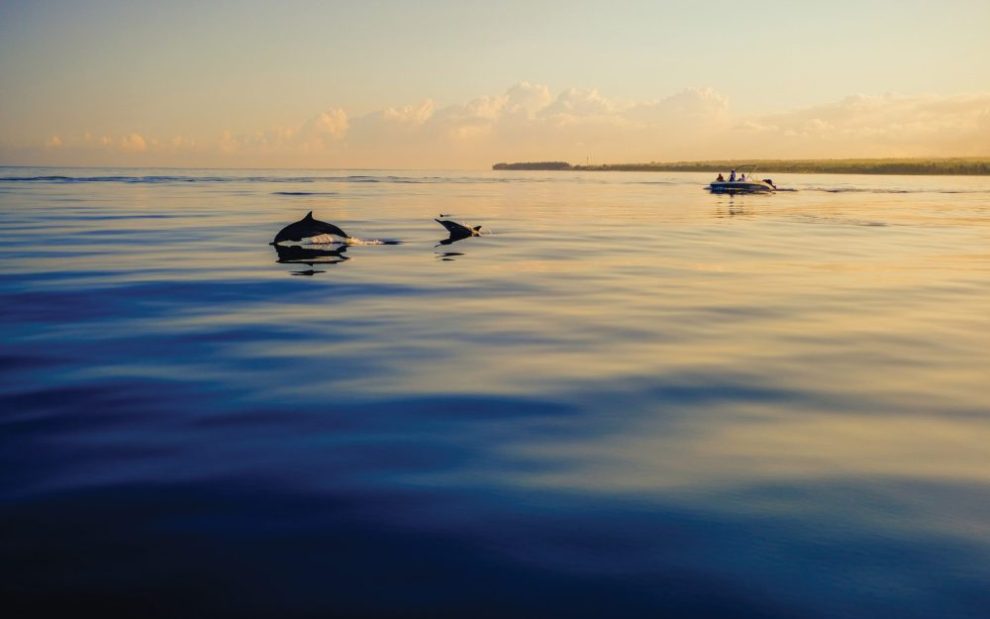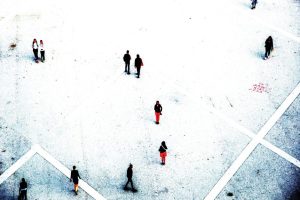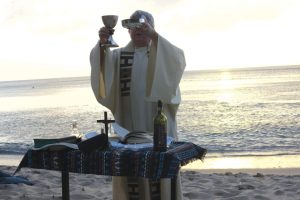In January, dolphins were spotted swimming in the Bronx River. This was simply unthinkable not long ago. The once infamously polluted waters in and around New York City have recovered remarkably thanks to the success of the Clean Water Act and other environmental protection efforts. Seals, dolphins, and humpback whales are all now regular visitors to Rockaway Beach, Queens, where I live. Less exciting to some is the return of spinner sharks, with which we now compete for swimming time. Lifeguards quickly pull swimmers out of the water at a confirmed shark sighting. When a shark mistakes a surfer or swimmer for fish, it can be dangerous for those in the water. What does it mean to share a common home with not just friendly dolphins but also sharks? What are my responsibilities to my neighbors offshore?
Care for our common home, as Pope Francis frames our responsibility to care for the Earth, is central to our Christian faith. To be human, he notes in Laudato Si’ (On Care for Our Common Home), is to be in relationship not only with God and our neighbors, but “with the earth itself.” It can be hard to grapple with our relationship to the Earth. We are wholly and entirely dependent upon creation for our survival. At the same time, the magnitude of both climate change and our responsibility to respond is overwhelming.
Navigating the personal amidst the collective call to care for creation is difficult. It is easy to get stuck in feelings of guilt. Care for dolphins means protecting them from human threats such as pollution, ships, fishing nets, and balloons. Cleaning up the ocean is a good example of a moral duty that is necessarily collective as well as personal.
Individually we are called to cultivate ecological virtue in our relationship with creation. In Fratelli Tutti (On Fraternity and Social Friendship), Pope Francis praises those “who enjoy a surplus of water yet choose to conserve it” for they “have attained a moral stature that allows them to look beyond themselves.” While we know that individual water conservation does not make a large impact on the system, it greatly impacts our own relationship to the Earth. It is an important way of taking up our responsibility to care for creation.
We are also called to conserve and protect even those parts of creation that are less cute—such as sharks. In her new book, Saving Us: A Climate Scientist’s Case for Hope and Healing in a Divided World (Atria), Katharine Hayhoe connects action on climate change to the love that is at the heart of the gospel. She argues that “it’s not only our responsibility, it’s who Christians believe God made us to be.”
Connecting our personal conservation efforts to wider collective ecological action is the next step. The image of our common home is meant to help us imagine that we share one home with the rest of creation. It is our moral responsibility to support public efforts to address climate change, even though these changes may involve personal sacrifice. Rethinking energy consumption both personal and industrial is but one flashpoint in our moral duty to care.
Catholic social teaching emphasizes the need for families, local communities, states, nations, and the international community to work together for public and private action to protect the Earth. In 2021, the Dicastery for Promoting Integral Human Development and partners launched the Laudato Si’ Action Platform as one way to help Catholic communities around the world develop plans for living out our responsibility to care for creation. It invites individuals, families, and parishes to develop their own seven-year plans.
Ultimately, care for creation is not only a moral duty but also an act of worship. All of creation glorifies the creator and is loved by God. Laudato Si’ calls on all Catholics to reflect more on the value the Earth has to God, as it is loved by God independent of humanity. The dolphins and the spinner sharks glorify God and reflect back to us the image of their creator. And as Earth Day comes during this Easter season, we are called to ask how Jesus is “the Risen Lord who permeates all things.” Including, as noted by Pope Francis in Querida Amazonia (Beloved Amazonia), how “[Christ] is present in a glorious and mysterious way in the river, the trees, the fish and the wind, as the Lord who reigns in creation.”
This article also appears in the April 2023 issue of U.S. Catholic (Vol. 88, No. 4, page 40-41). Click here to subscribe to the magazine.
Image: Unsplash/Matteo Catanese














Add comment